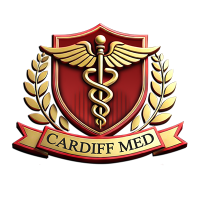Cardiology MSc
Master advanced cardiology skills to improve patient outcomes with flexible online learning tailored for busy healthcare professionals.
Overview
Our MSc in Cardiology is designed for specialist nurses, GP trainees, A&E staff, and healthcare professionals aiming to advance their expertise in cardiovascular care. This flexible, part-time online course develops your clinical skills, decision-making, and leadership abilities in managing complex cardiology cases across primary and secondary care settings.
Validated by the Royal College of Physicians (RCP) for CPD points, the programme offers global networking opportunities and expert-led learning. You’ll gain a systematic understanding of cardiology, apply evidence-based practices, and enhance your problem-solving and research skills for real-world patient care.
Whether you're looking to lead multidisciplinary teams or improve service delivery, our MSc equips you with the knowledge and confidence to excel in modern cardiology practice.
Entry Requirements
Our fully online MSc in Cardiology is open to both UK and international registered healthcare professionals.
Applicants typically need a relevant first degree (or equivalent international qualification) in healthcare, such as medicine or nursing.
Healthcare professionals without a formal degree may also be considered based on their clinical experience. In such cases, applicants might be asked to submit an assessed piece of work to demonstrate their ability to study at a postgraduate level and their clinical competence.
- A copy of your updated CV including your address and date of birth.
- A copy of your undergraduate degree certificate.
- The name and email address of someone who is able to provide a reference, this can be a work colleague, employer or former tutor.
- A detailed personal statement explaining why you would like to undertake the course.
- A copy of your proof of English competency (see below).
Proficiency in the English language is also essential to completing our courses. If English is NOT your first language, we ask for proof of competency during the application process. We are able to accept an IELTS (with an overall score of 6.5 and a minimum of 6.0 for each band) or an equivalent qualification.
If you do not meet these requirements, please don’t worry, you can also contact our admissions team on admissions@cardiffmed.com for more information on the qualifications we accept.
Should you have already successfully completed the 1 year Postgraduate Diploma and wish to convert to the MSc and complete only the second year of the program this is possible. Please contact our admissions department info@cardiffmed.com to find out more.
Key Facts
- Awarding University
- Starting Date: 1st September 2025
- Application Deadline : 29th August 2025
- Class Size : 15 - 20
- Duration : 24 months
- Commitment : Part-time
- Format : 100% Online
Course Fees
- Deposit for September 2025: £400 †
- Total Course Fees for UK & International Students for September 2025: £9,125 ††
Payment Options
- Option 1: Upfront Payment in full. Pay-in-full discount is available.
- Option 2: Apply for Interest-free payments each month for the duration of the course.
Payment Plan Breakdown
First Year Payments
| Deposit | 10 Monthly Payments | Final Payment |
| £400 † | £393 | £395 |
Total first year payments: £4,725
Second Year Payments
| 11 Monthly Payments | Final Payment |
| £366 | £374 |
Total second year payments: £4,400
You may also be interested in:
- Spread the cost with Lendwise, who offer financing options for up to 8 years. ††††
† Deposits are non-refundable
†† Prices are subject to review following each intake
†††† Subject to eligibility criteria.
Course Modules and Learning Outcomes
The online Cardiology MSc is a two-year course, consisting of eight modules (180 credits) with the first 120 credits deriving from the Postgraduate Diploma.
Year 1
Module Aims
Develop a comprehensive understanding of the presentation, diagnosis and management of patients with ischemic heart disease.
Synopsis of Module Content
- Acute presentation with chest pain and diagnostic dilemmas
- Chronic and recurrent chest pain
- Diagnostic tests in coronary artery disease (CAD) – ECG, echo, stress test, SPECT, CT, CMRI
- Pharmacological treatment of coronary artery disease
- Interventional treatment of coronary artery disease
- Complex patient with coronary artery disease – comorbidities, non-cardiac surgery, end-stage disease
Module Outcomes
- Differentially diagnose causes of chest pain and ischemic heart disease and select appropriate investigative and treatment options.
- Critically analyses incomplete and/or contradictory evidence, developing effective methodologies to explain recommendations in complex ischemic heart disease contexts.
- Develops advanced interpersonal, team and networking skills to strategically enhance team performance in complex situations and contributes to the field of ischemic heart disease. Expands ability of argument presentation in multipronged discussion with the focus on the optimal patient benefit.
Module Aims
Develop a comprehensive understanding of the presentation, diagnosis and management of patients with heart failure.
Synopsis of Module Content
- Shortness of breath and other symptoms of heart failure
- Diagnostic tests in heart failure – ECG, echo, CT, CMRI
- Pharmacological treatment of heart failure
- Interventional treatment of heart failure
- Right heart failure – symptoms, pathophysiology, diagnostic management, treatment
- Complex patient with heart failure – comorbidities, non-cardiac surgery, end-stage disease
Module Outcomes
- Demonstrate an in-depth understanding of the diagnosis, treatment and management of heart failure, including the management of exacerbations and co-morbidities recognizing the complex effects on patient morbidity and mortality.
- Selects and adapts appropriate advanced problem-solving strategies, methods and techniques to design systematic investigations that define and critically evaluate problems related to heart failure.
- Critically evaluate the role of palliative and end-of-life care in heart failure with an identification of a crucial role of local services.
Module Aims
Develop a comprehensive understanding of the presentation, diagnosis and management of patients with arrhythmias.
Synopsis of Module Content
- Symptoms and basic diagnostic tests of arrhythmia - ECG, Holte
- Other investigation tests in arrhythmia - echo, stress test, CT, cMRI, EPS, genetic test
- Atrial arrhythmia – differentiation, pharmacological management, interventional management
- Stroke prevention in atrial fibrillation – anticoagulation, non-pharmacological prophylaxis
- Ventricular arrhythmia – differentiation, pharmacological management, interventional management
- Syncope due to other reasons
Module Outcomes
- Compare and contrast the range of presenting rhythm disturbances and how they are investigated.
- Demonstrate a comprehensive understanding of the diagnosis, treatment and management of supraventricular arrhythmias.
- Identify and differentiate common causes of syncope, and propose their investigation and treatment.
- Communicate advanced arrhythmia-related information for different audiences in a variety of contexts.
Module Aims
Develop a comprehensive understanding of the presentation, diagnosis and management of patients with valvular heart disease.
Synopsis of Module Content
- Symptoms and signs of valvular heart disease
- Diagnostic tests in valvular heart disease – ECG, echo, stress test, CT, CMRI
- Aortic valve disease – screening, pharmacological and interventional management
- Mitral valve disease – screening, pharmacological and interventional management
- Pulmonary and tricuspid valvular disease– screening, pharmacological and interventional management
- Congenital Heart Disease
Module Outcomes
- Apply in-depth understanding of anatomy, pathophysiology and the physiology of the cardiovascular system and its relevance to the pathophysiology of valvular heart disease.
- Demonstrate an in-depth understanding of the diagnosis, prevention, treatment and management of valvular heart disease.
- Justify and critically evaluate indications for interventional management of valvular heart disease.
- Demonstrate understanding of the presentation, diagnosis and management of Congenital Heart Disease.
- Systematically synthesizes advanced and specialist cardiological-related information and ideas, and formulates and develops innovative proposals to address valvular and congenital heart disease.
- Applies advanced interpersonal, team and networking skills to enhance team performance in unpredictable contexts strategically and contributes to the field of Valvular Heart Disease and Congenital Heart Disease.
Module Aims
Develop an understanding of the presentation, diagnosis and management of patients with wide-range cardiovascular diseases.
Synopsis of Module Content
- Cardio Oncology
- Pulmonary embolism
- Pulmonary hypertension
- Aortopathy and other vasculopathies
- Endocarditis
- Myocarditis and pericarditis
Module Outcomes
- Identify and manage cardiovascular issues related to oncological therapies
- Demonstrate an in-depth understanding of the diagnosis, treatment and management of pulmonary embolism
- Critically differentiate conditions that lead to pulmonary hypertension, their investigation and treatment
- Formulate a robust approach for investigating and treating patients with aorta abnormalities
- Compare the presentation, diagnosis and management of myocarditis, pericarditis and endocarditis
- Demonstrate knowledge of issues related to the management of a patient with endocarditis
Module Aims
Develop a comprehensive understanding of the significance of physical activity and cardiovascular prevention, and depth insight into the association of various comorbidities with cardiovascular risk.
Synopsis of Module Content
- Dyslipidemia – diagnostic management, risk assessment and treatment
- Hypertension – diagnostic management, risk assessment and treatment
- Patients with diabetes and cardiovascular disease
- Kidney dysfunction and cardiovascular disease
- Physical activity of patients with arrhythmia and elements of sports cardiology
- Physical activity of patients with CAD, HF or after a heart surgery
Module Outcomes
- Identify and manage cardiovascular risk factors in primary and secondary prevention
- Formulate a robust approach for investigating and treating patients with dyslipidemia
- Demonstrate in-depth understanding of the diagnosis, treatment and management of hypertension
- Demonstrate knowledge of issues related to the management of a patient with diabetes
- Apply in-depth understanding of the interdependence between cardiovascular diseases and renal dysfunction, its investigation and management
- Formulate comprehensive recommendations for physical activity in different clinical scenarios
Year 2
To prepare students for an independent research-based project by developing skills in selecting, appraising, discriminating, using evidence and appropriate research/investigative methods to address relevant topics for investigation. The professional project module provides students with an opportunity to complete an important, substantial and potentially publishable study of their own choosing.
Module outlines
This module will start by focusing on research methods using the Academic Forum. Students will learn about research methodologies and critical appraisal over a period of 8-weeks.
- Quantitative Studies
- Statistical Analysis Interpretation
- Interpreting the Evidence
- Meta-analysis and Systematic Reviews
- Qualitative Studies
- Evidence Appraisal: Interpreting, Weighing and Synthesizing the Evidence
- Audit, Governance and Quality Improvement, Health Economics
- Preparing a Research Proposal: Research Committees, Consent, Ethics, Probity and Literature Review
Following the research methods, students will submit a professional project proposal for their chosen topic, this includes a proposal form and ethics application. Students are given a 4-week period after the research methods to complete this.
Students will then create a piece of work based upon a specific subject-related project relevant to the student’s practice. The students will have a further 24-weeks to complete this. This project may comprise:
- Systematic literature review and appraisal of the evidence
- Audit of non-patient data/organisational audit
- Review and implementation of evidence-based practice
- Literature review and qualitative or quantitative research proposal
- Case(s)-based and quality of service review with critical appraisal
- Case report, review of literature and organisational assessment
- Secondary data analysis
Programme Leader
The hospital plays a statewide services includes the Acquired

Prof. Maciej Kostrubiec
Programme Leader
Obtained his medical doctor degree at the Warsaw Medical University in Poland in 2000

Prof. Maciej Kostrubiec
Programme Leader
Validated and Supported by Trusted Institutions
Validating partner
University of Buckingham
Accreditors and Endorsers
European Union of Medical Specialists (UEMS)
Assessment Methods
This programme emphasises learning through active participation in case-based discussions, reflection, and real-life scenarios. Students engage with clinical cases that mirror everyday practice, fostering problem-solving and evidence-based application from the very beginning.
Across the modules, assessments are integrated with learning. Each week, you will work through two to three clinical cases, discussing and reflecting on them with peers under the guidance of an expert tutor. These discussions form the core of your learning and are also the basis for your assessments.
Our innovative teaching methods are designed to help you translate this learning into real-world clinical practice. You’ll need to regularly log in to participate in discussions, ideally daily, and commit approximately two hours per day to your studies. Our dedicated Student Support Team is available to assist with any challenges you may encounter, from navigating our online platform to managing deadlines.
How Foundational Knowledge is Developed
The programme is structured so that foundational knowledge is introduced through carefully designed clinical cases. Each case is crafted to highlight essential concepts and progressively deepen your understanding as you apply critical thinking and evidence-based analysis. This hands-on approach ensures that you are not only acquiring theoretical knowledge but also learning how to apply it in a practical, clinical setting.
This programme is suited for professionals who thrive in an online, discussion-based learning environment. Please note that this course focuses on interactive, applied learning through peer collaboration and case discussions. You will be fully supported, encouraged, and led through the programme to success and graduation!
Year 1
- Every week students are presented with two/three clinical case-based scenarios that are reflective of every day clinical practice and research.
- Tutors will post a number of questions and prompts to aid students in a formal discussion of each case.
- These discussions are facilitated throughout by your tutor and are then assessed at the end of every module.
For this assessment, students will work on a group assignment and/or an individual assignment.
- Group assignments are designed to hone skills in the multidisciplinary, holistic approach to modern treatments and patient management by requiring group participation in a single piece of work.
- Individual assignments are designed to hone skills in academic career progression through such tasks as reviewing papers, developing scientific posters or abstracts, peer-reviewing, social media activities, patient information leaflets and essays.
The reflective journal is used by students throughout each module to monitor personal progress. This is guided by weekly feedback from your tutor and is graded at the end of every module. The journal typically includes the following:
- Initial expectations and reasons for taking the course.
- Module and/or personal learning objectives.
- Description of events, issues and learning points within current personal practice.
- Change in every day practice due to knowledge gained on each module.
- A description of what has been learned during the module.
- Students are provided with case-based problems in the form of a one-hour timed examination.
- The exam consists of 30 'Single Best Answer' questions.
- Students are required to complete the exam online within the set time.
Year 2
This module runs over an 8 week period and is designed to develop skills in critical appraisal and knowledge of research methodologies. The module consists of mandatory formative assessment activities to support your learning and development prior to the Professional Project module.
Students will work with their supervisor to submit a professional project proposal for their chosen topic.
Students will deliver an abstract (1000 words) outlining their proposal and, if deemed necessary, develop and submit documentation for the University’s ethical committee approval.
- Students will create a dissertation, the theme of which has been developed in discussion with their tutor.
- Supervision will normally involve direct online support involving planned progress, supporting research activity and reading student work.
- Supervisors and students will agree on a communications plan, which may involve emails or online chats. Some students may employ the use of freely available chat or audio conferencing facilities for live discussion with supervisors.
- Students will have access to online forums where they can develop their research capabilities together.
- All communications with tutors will be logged on the Professional Project forum by the student, and consist of brief summaries of discussion.
Why Study Cardiology Master's with CardiffMED
100% Flexible
Our courses are 100% online. No fixed study times mean you can log in and learn whenever and wherever.
Multidisciplinary – study in a group of doctors, nurses, pharmacists and other healthcare professionals.

Career Boosting
Get a University-validated postgraduate qualification in just 1 calendar year instead of 2 academic years.
40% of our alumni reported a salary increase 2 years after studying with us.

Expert Led
All of our programmes are authored and developed by world-leading experts in their field.
Our faculty are selected due to their subject expertise, experience, and teaching abilities to ensure the highest standards of educational excellence.

Our cardiology online courses are directed to specialist nurses in cardiology, GP trainee with a view to cardiology, healthcare professionals who work in A&E, Specialist Registrars/CTs and Pharmacists with a specialist interest. The knowledge of heart and cardiovascular anatomy and physiology is mandatory. The students are expected to be familiar with cardiovascular medication and have at least a basic understanding of electrocardiogram (ECG).
You'll learn through our flexible, interactive online platform, which allows you to engage with clinical cases, complete assignments, and collaborate with fellow students at times that suit your schedule. There's no fixed timetable—simply log in daily to participate in the week's activities.
Our teaching approach is highly interactive, using small groups of 10-20 students to foster a collaborative environment where you can engage in thoughtful discussions and receive guidance from your tutor. You'll have access to learning resources and discussion forums that encourage ongoing interaction and deeper engagement with the material.
Throughout your studies, you'll receive support from a dedicated expert tutor and our Student Support Team, ensuring you have the resources needed to navigate the course successfully.
Why Enroll in This Program
Awarding University
University of Buckingham





